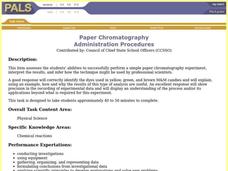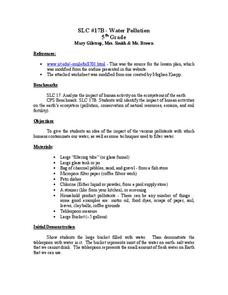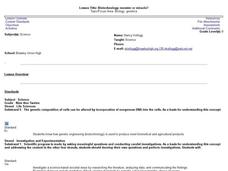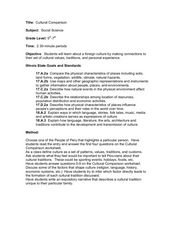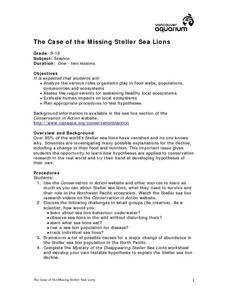Curated OER
Frogs: Fact or Folklore
Young scholars discover how frogs are adapted to their environment. They view and discuss a Discovery Channel video on frogs and the myths surrounding frogs. In small, groups they compile data on frogs from the internet to create a...
Curated OER
Comparisons of the Past Simple and Present Perfect Verb Tenses
For this past simple and present perfect verb tense worksheet, students study two tables that show the proper use of the verb tenses. They complete 7 sentences by putting the verbs in brackets into the correct verb tense.
Curated OER
Paper Chromatography
Small groups of learners perform paper chromatography to separate food dyes into their component colors. Students perform the experiment and collect, organize, and represent their data to form an explanation of their outcomes. Learners...
Curated OER
The Solar System: Why do we Explore?
Third graders act as scientists. In this property discovery lesson, 3rd graders explore the substance "Oobleck" (cornstarch, water, food coloring). They work in groups to investigate the substance and make observations as a scientist...
Curated OER
Microbe Experimentation: Sour Milk
Sixth graders design and conduct an experiment with milk to investigate how temperature affects bacteria growth. They, in groups, construct a hypothesis, perform the experiment and then record and present the results.
Curated OER
Biotechnology Projects and Writing Assignments
Students research a subject about biotechnology and do a project or a writing assignment on it. They can pick from a possible eighteen different projects and five different writing projects.
Curated OER
Wacky Wildlife World
Fourth graders research organisms in the environment in Kentucky and create brochures for the local area wildlife reserves. Individuals create brochures that include information on habitat, body characteristics, scientific class, role...
Curated OER
The Business of Design
Young scholars visit the Design for the Other 90% exhibition. In this design lesson, student learn how to design for the population of the world that is poor or impoverished. In addition, students read New York Times articles and watch...
Curated OER
Changing the World: Social Entrepreneurs Part Two
High schoolers explore the work of social entrepreneurs. In this entrepreneurship lesson, students research a specific entrepreneur and create a presentation introducing him or her to the class. High schoolers design a seminar on social...
Curated OER
Sales Tax and Discounts
Middle schoolers explore the concept of sales tax and discounts. In this sales tax and discounts lesson, students pretend to gamble in groups to win fake money. Middle schoolers must tax their winnings. Students collect receipts. Middle...
Curated OER
I'm Tellin'!: Kids Bringing Folktales Alive
Students participate in a reading lesson that works on social and academic skills. They increase reading comprehension with direct instruction with the group reading of a folktale. Then students research their own stories to tell.
Curated OER
Microarrays: Chipping Away at the Mysteries of Science and Medicine
Learners research microarrays on the internet in cooperative groups. Students write an essay describing the use of microarrays in environmental research and in medicine.
Curated OER
The Columbian Exchange
Students examine the process of the Columbian Exchange. In groups, they create a poster showing the good exchanged and the people affected. They note the impacts of the Exchange on the world and present their poster to the class to end...
Curated OER
How Does A Seed Become A Plant?
First graders evaluate what it takes for a seed to become a plant. They brainstorm what they know, discuss what they want to know and interact with a Plant WebQuest that indicates what they have learned. They also examine how we get the...
Curated OER
Water Pollution
Fifth graders investigate how humans pollute the water supply with a number of different contaminates. While working in small groups they examine screening, sedimentation, filtration, and chemical treatments as methods of water treatment.
Curated OER
Visit a Mesopotamian House
Students examine the various types of architecture used in Mesopotamia. In groups, they identify how climate, resources and cultures affect where and how people live. Using a worksheet, they compare and contrast their house to the one...
Curated OER
Levels of Organization
Students brainstorm a list of all the functions organisms carry out and how they carry them out. In groups, they are given the smallest and highest level of organization in organisms and are to fill in the missing spaces. To end the...
Curated OER
Biotechnology: Monster or Miracle
High schoolers explore biotechnology. In this scenario-based lesson, students take a survey on what they know about genetic engineering, view a PowerPoint, and conduct a web quest. High schoolers will then be placed in groups, and...
Curated OER
Cultural Comparison
Students choose from a group of entries about the culture of Peru. In this Peruvian culture lesson, students understand the definition of culture. Students describe the culture of Peru researched in the entry and complete a worksheet.
Curated OER
Born Equal
Young scholars work in small groups to list advantages and disadvantages of being a woman. The focus of the lesson is upon discrimination. Working in a group provides scaffolding to help learners who are disadvantaged for any reason.
Curated OER
What's On Your Plate?
Students explore the use of sensory details in writing. In this journal writing lesson, students write four journal entries after group discussion about a variety of topics such as their weekend, poverty in the United States, and...
Curated OER
The Case of the Missing Steller Sea Lions
Students identify and analyze the various roles organisms play in food webs, populations, communities and ecosystems. Students assess the requirements for sustaining healthy local ecosystems. STudents evaluate human impacts on local...
Curated OER
Charlotte's Web
Students compare the differences in insects and spiders and design a worksheet that teaches the differences. Students record on chart
organizing the information about the pet, its food, habitat, exercise, and other ways to care for...
Nemours KidsHealth
Safe and Healthy Summer: Grades 6-8
The pull to sloth can be strong in the summer. The couch and the beach beckon, but the lazy days also provide the opportunity to practice healthy habits. Two activities urge tweens to try something new. First, they research healthy items...


